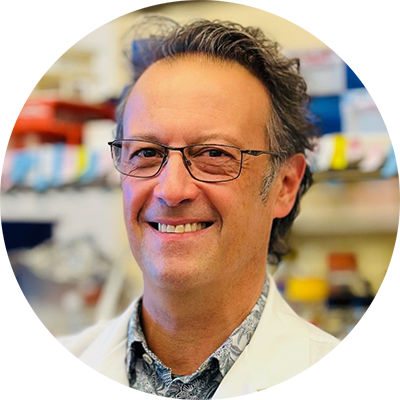Keynote speakers

Christer Betsholtz
Christer Betsholtz took his PhD at Uppsala University in 1986 and moved to Gothenburg University as Professor of Medical Biochemistry in 1994. Initially focusing on PDGF and cancer, he found that PDGF-B signaling drives the recruitment of pericytes to blood vessels and became more broadly interested in angiogenesis and the interplay between different cell types in this process. In 2004, he moved to the Karolinska Institute in Stockholm, and since 2013 he shares his time between Uppsala University as Professor of Vascular and Tumor Biology, and Karolinska Institute as Professor of Vascular Biology. His work has helped explaining how blood vessels sprout in the CNS by the formation of specialised endothelial tip and stalk cells, how the endothelial cells signal to the pericytes in order to promote their co-recruitment during angiogenic sprouting, and how pericytes finally stabilise the capillaries and promote maturation of the BBB. His work also has shed light on genetic causes of neurovascular diseases, and he has mapped the gene expression patterns of the brain’s different vascular cell types with high detail, opening new doors for the discovery of physiological functions and disease mechanisms in the brain.
He has been honored with numerous awards for his work, including the Göran Gustafsson’s Prize in Molecular Biology in 1997, the Del Monte Medal in Neuromedicine of Rochester University in 2010 and the Louis-Jeantet Medical Prize in 2018.

Stefan Knapp
Prof Stefan Knapp studied Chemistry at the University of Marburg (Germany) and at the University of Illinois (USA). He did his PhD in protein crystallography at the Karolinska Institute in Stockholm (Sweden) (1996) and continued his career at the Karolinska Institute as a postdoctoral scientist (1996-1999). In 1999, he joined the Pharmacia Corporation as a principal research scientist in structural biology and biophysics. He left the company in 2004 to set up a research group at the Structural Genomics Consortium at Oxford University (SGC). From 2008 to 2015 he was a Professor of Structural Biology at the Nuffield Department of Clinical Medicine (NDM) at Oxford University (UK) and between 2012 and 2015 he was the Director for Chemical Biology at the Target Discovery Institute (TDI). He joined Frankfurt University (Germany) in 2015 as a Professor of Pharmaceutical Chemistry and the Buchmann Institute of Molecular Life Sciences. He remains associated to the SGC as a visiting Professor at Oxford and he is also adjunct Professor of the George Washington University. Since 2017 he is the CSO of the newly founded SGC node at the Goethe-University Frankfurt. His research interests are the rational design of selective inhibitors that target protein kinases as well as protein interactions modules that function as reader domains of the epigenetic code.

Alex Toker
Alex Toker received a B.S. from King’s College, University of London, and a PhD from the National Institute for Medical Research. He conducted post-doctoral research in the laboratory of Lewis Cantley in the Department of Medicine at the Beth Israel Deaconess Medical Center (BIDMC). He is currently professor at the Department of Pathology, Harvard Medical School, and Chief of the Division of Signal Transduction at BIDMC. He is a recipient of an Outstanding Investigator Award from the National Cancer Institute and of the 2022 Avanti Award in Lipids (ASBMB)
For over 25 years, Dr. Toker’s research has focused on signal transduction mechanisms in normal and malignant cells. In the mid 1990s, he discovered the mechanism by which phosphoinositide 3-kinase transduces signals to the protein kinase effector AKT/PKB, and has since maintained an active interest in AKT regulation and function, with special emphasis in breast cancer. His group was the first to discover specific functions of AKT isoforms in breast cancer, and has also identified a number of specific substrates that transduce the AKT signal in phenotypes associated with malignancy. More recently his group has been investigating the reprogramming of metabolic pathways by aberrant PI3K and AKT signaling in human cancers, and has also uncovered mechanisms that mediate resistance to both small molecule inhibitors under clinical development, as well as chemotherapeutic agents that are standard-of-care in the clinic. The goal of his laboratory is to decipher the complex mechanisms by which these pathways impact cancer progression, with the ultimate goal of developing drugs to interfere with malignancy and metastasis.

Veronica Kinsler
Veronica Kinsler is Professor of Paediatric Dermatology and Dermatogenetics at Great Ormond Street Hospital for Children and UCL, and Principal Group Leader of the Mosaicism and Precision Medicine laboratory and Assistant Research Director at the Francis Crick Institute in London. She also holds a UK NIHR Research Professorship. She trained in medicine at Cambridge, paediatrics and paediatric dermatology in London, molecular genetics at UCL, and worked part-time for 15 years to look after her family. Clinical work is focused on rare paediatric skin conditions, in particular mosaic and/or pigmentary disorders. Laboratory research is focused on identifying the genetic causes, and design or repurposing of targeted therapies. In parallel, the lab extrapolates findings to gain valuable insights into common conditions such as melanoma, and into normal human embryology. She is the past President of the ESPD, senior editor of the Harper textbook of Pediatric Dermatology, and director of Paediatric Dermatology Online Courses www.paediatric-dermatology.com